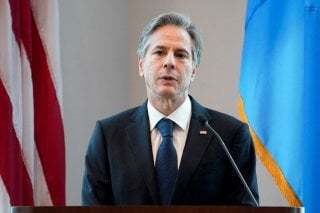Secretary Blinken Outlines the Biden Administration’s China Strategy
Secretary of State Antony Blinken vowed that the Biden administration would carefully manage the United States’ relationship with China.
In a speech at the George Washington University in Washington, DC, Secretary of State Antony Blinken vowed that the Biden administration would carefully manage the United States’ relationship with China—characterized by Blinken as the most significant political and economic relationship of the twenty-first century—without either ignoring Beijing’s persistent human rights issues or attempting to instigate conflict.
Early on in his remarks, Blinken described China as “the most serious long-term challenge to the international order,” noting that it was “the only country with both the intent to reshape the international order and, increasingly, the economic, diplomatic, military, and technological power to do it.”
“Beijing’s vision would move us away from the universal values that have sustained so much of the world’s progress over the past seventy-five years,” Blinken said. However, he claimed that the Biden administration was “not looking for conflict or a new Cold War” and was “determined to avoid both.”
Instead, the secretary claimed that, rather than “rely[ing] on Beijing to change its [political] trajectory,” the United States would “shape the strategic environment around Beijing to advance our vision for an open, inclusive international system.” He suggested that this reshaping would occur through enhanced multilateral cooperation with U.S. allies in the Indo-Pacific region and greater emphasis on democratic institution-building abroad.
At the same time, Blinken promised that the United States would not attempt to stifle China’s economic growth through punitive economic measures or seek to minimize its role in foreign affairs.
Over the past decade, relations between China and the West have soured as President Xi Jinping has sought a more assertive role for the country in international affairs. In recent years, Chinese officials have vocally rejected Western liberalism and democracy as unsuited for China’s conditions and defended China’s one-party state as a more efficient alternative. China’s leaders have also expanded the country’s role in the Indo-Pacific and made moves toward capturing the de facto independent island of Taiwan. During a visit to Japan earlier in the week, Biden claimed that the United States would defend Taiwan using military force if China attempted to invade, leading to a sharp rebuke from China’s Foreign Ministry.
Although former President Donald Trump sought to decouple the American and Chinese economies through hostile trade policies—infamously claiming in 2018 that “trade wars are good, and easy to win”—Blinken dismissed these efforts as unrealistic and harmful to the U.S. economy.
“The United States and China have to deal with each other for the foreseeable future,” he said.
Trevor Filseth is a current and foreign affairs writer for the National Interest.
Image: Reuters.

